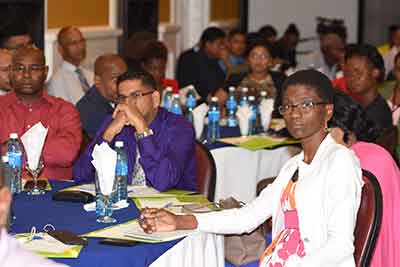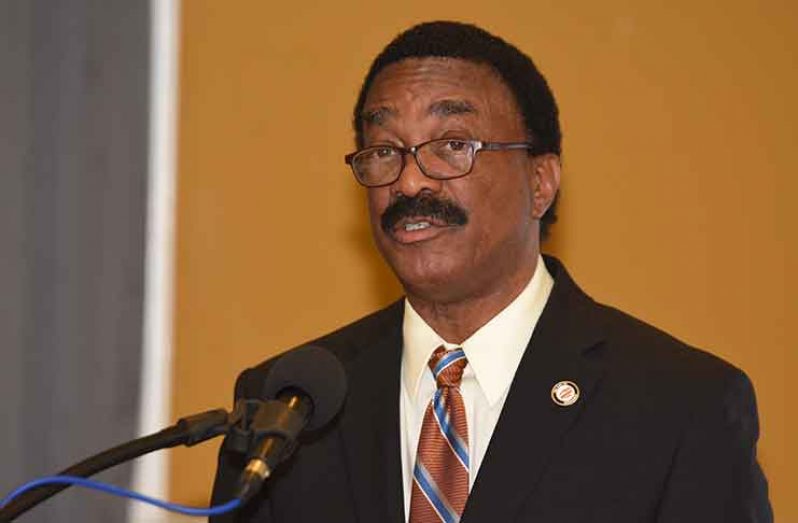…urges coordinated efforts to tackle scourge
ATTORNEY General Basil Williams has warned that money-laundering risks here are high and called on all stakeholders to be proactive in countering these threats.
He said Guyana has an overall, high money-laundering risk and a medium terrorist financing threat which are realities from which the country must not shy away, but must address head-on. Williams was speaking at the time at a seminar on Guyana’s Money Laundering (ML) and Terrorist Financing (TF) Risk Assessment hosted at the Georgetown Club on Wednesday.

In attendance were Acting President Moses Nagamootoo, Business Minister Dominic Gaskin and Public Security Minister Khemraj Ramjattan.
Others included: Director of Public Prosecutions (DPP), Shalimar Ali-Hack; National Anti-Narcotics Agency Head, Michael Atherly; Governor of the Bank of Guyana (BoG), Gobind Ganga; Chief Parliamentary Counsel, Charles Fung-a-Fat; heads of the public and private sectors and other heads of supervisory bodies.
The gathering met as Guyana is currently working to meet certain criteria set out by the Financial Action Task Force (FATF) for its Fourth Round of Mutual Evaluation process set for 2022. The Fourth Round will test both the country’s technical compliance with regard to existing laws and regulations and its effectiveness on whether it is achieving the defined set of outcomes.
In efforts to comply with these guidelines, Guyana conducted a national risk assessment exercise between February 2016 to April 2017, resulting in the creation of a National Risk Assessment (NRA) report and a Risk-based Action Plan.
A working group of 74 persons from the public and private sectors worked towards understanding, identifying and assessing the ML and TF threats in Guyana and received technical support and guidance from the Inter-America Development Bank (IDB) and the World Bank.

The NRA examines the level of risk within sectors, such as banking, mining, insurance securities as well as government organisations such as the Guyana Police Force (GPF), the Guyana Revenue Authority (GRA) and the Financial Intelligence Unit (FIU).
Meanwhile, the Risk-based Action Plan outlines action to be taken, agencies or organisations responsible for such action and the timelines by which these actions should be addressed.
Williams, in his opening remarks, said that Guyana must remain focused and work strategically to mitigate its current high-risk rating. “The NRA determined that the overall risk of money laundering in Guyana is high. This outcome stems from the high rate assigned to the overall national threat and vulnerability which is rated medium-high…regarding terrorist financing, the threat is medium,” he reported, adding: “It is important for me to paint this realistic picture, so that we can know where we are and the amount of work that we have to do come 2022, when we will be assessed again.”
Williams said that the action plans serve as the base of the country’s Anti-Money Laundering (AML) and Countering Financing of Terrorism (CFT) strategy, which will help to assist in mitigating existing threats and vulnerabilities.
In addition, the organisations featured in the Action Plan were allowed to provide feedback on the challenges faced in meeting the stipulated timelines which Williams says is useful information for the country.
“This process will help us to be more effective and efficient as we will know where we are and what else needs to be done…following up on the risk-based action plan allows us to bridge the gap between planning and implementation, which is critical. Guyana is scheduled to be assessed in 2022 and we cannot afford to be anything but proactive,” he said.
He added that the country must be able to demonstrate that, in addition to having a legal and institutional framework, its AML/CFT system, it is effective and be able to deliver on the recommendations of FATF.
As such, he called on all stakeholders, including Cabinet ministers, to throw in their efforts towards addressing high-risk areas and ensuring Guyana improves over time. He also stressed the need for effective sharing of information and for reporting entities and Designated Non- Financial Business and Profession (DNFBPs) to be effectively supervised to safeguard compliance with AML-CFT laws and regulations.
“I wish to remind all of us that money laundering, terrorist financing and proliferation financing is a global problem that affects the stability and prosperity of every country. Therefore, let us be proactive and take the necessary steps to strengthen our AML/CFT regime,” he urged.
In November 2017, Guyana was the host of the 46th Caribbean FATF Plenary and Working Group Meeting with some 200 representatives from member countries and other international financial institutions meeting to discuss pressing issues.
When the government took office in May 2015, Guyana had been blacklisted both by CFATF and FATF; however, with leadership of President David Granger and Williams, the country made significant progress and now works towards becoming fully compliant.













